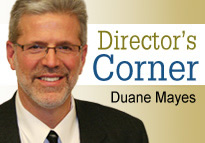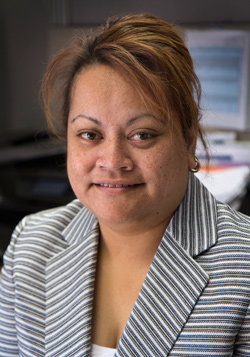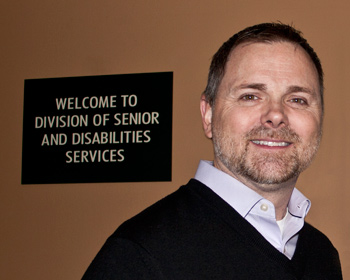New NFLOC and PCA managers: Moli Atanoa and Rodney George
SDS employees promoted to their units' top spots
Please join me in congratulating Moli Atanoa on her promotion to Nursing Facility Level of Care Unit manager. Moli replaces Leanna Hunter, who is enjoying a well-deserved retirement.
|
The NFLOC unit manages three of Alaska’s four Medicaid waivers, serving more than 2,900 clients in numerous agencies: Adults Living Independently (2,535), Children with Complex Medical Conditions (281), and Adults with Physical and Developmental Disabilities (97). The Intellectual Developmental Disabilities waiver is managed separately. NFLOC also oversees prior authorizations for nursing-home stays for all Alaska Medicaid and Medicare clients.
Moli has 14 years’ experience as a nurse, and has worked with the state off and on since 2003. She has been in the NFLOC Unit for the past several years, where she has held a number of different roles, including supervisor, assessor and trainer. As unit manager, she takes on a greater supervisory role and is responsible for assessments, plan-of-care services for all individuals under those waivers, and prior authorizing nursing home stays.
To ensure the needs of these vulnerable populations are met, and to allow them to stay in the residence of their choice, the NFLOC unit works closely with many partners. Within SDS, those partners include the Intellectual Developmental Disabilities waiver; Personal Care Assistance; Quality Assurance; Research & Analysis; and Adult Protective Services. DHSS partners include Program Integrity and the Division of Public Assistance. Outside of the department, NFLOC works with the Department of Public Safety, Alaska Children’s Services, Department of Law, Anchorage Police Department, and others. Moli will continue those partnerships.
Fun fact: Moli’s a fan of fishing, camping and having s’mores with her family.
Welcome to Rodney George as the new Personal Care Assistance Unit Manager. PCA provides support for about 4,500 Alaskan seniors and individuals with disabilities statewide.
|
Rodney has been with the unit for a year and a half and was the acting unit manager for six months, so he brings expertise and experience to the position. Before coming to SDS, Rodney spent 23 years with the Air Force. When he left, he was the manager for a group of health care clinics in Joint Base Elmendorf Richardson’s hospital.
Fun fact: He is an Alabama Crimson Tide fan.
The PCA Unit is thrilled to have Rodney officially as manager.
![]()
Employment First
Alaska recently declared itself an “Employment First” state to create more job opportunities for Alaskans who experience disabilities.
|
“It’s quite a paradigm shift for people to put the focus on employment,” said Kristin Vandagriff, a program coordinator for the Governor’s Council on Disabilities and Special Education. She said that in the past, help finding and keeping a job was simply one of many service options in programs that different departments offered Alaskans who experience disabilities.
Now when the Department of Education and Early Development helps high school students with disabilities transition to their lives as adults, for example, a job will be a top priority, Vandagriff said.
And not just any job. The legislation sets a target of integrated, competitive employment. That means working in the community, for at least minimum wage, for at least 20 hours a week.
“Historically people with disabilities have been paid a lot less,” Vandagriff noted.
The new emphasis on employment is in line with a national push by the U.S. Centers for Medicare and Medicaid Services to ensure people who experience disabilities are fully participating in community life.
Gov. Sean Parnell signed House Bill 211 on May 29 at the Trust Beneficiary Employment Initiative Stakeholder Meeting, sponsored by the Alaska Mental Health Trust Authority. He was joined by several commissioners: Dianne Blumer, Labor and Workforce Development; Joe Schmidt, Corrections; Curtis Thayer, Administration, and of course William Streur, Health and Social Services.
Four departments must report annually on their “Employment First” progress to the Alaska Mental Health Trust Authority, Vandagriff said: Health and Social Services; Labor and Workforce Development; Education & Early Development; and Administration.
For more on Employment First, visit links to the law and a legislative packet on this Governor’s Council webpage: http://dhss.alaska.gov/gcdse/Pages/committees/et/documents.aspx.
The provisional hire program: An employment stepping stone
Sarah Bumpus can speak personally to the difference employment promotion programs – and their staff -- can make. She said years of major surgery and rehabilitation kept her out of the workforce and put her on Social Security Disability Insurance, or SSDI.
“My doctors thought I’d be on it forever,” Bumpus said, but that wasn’t the future she saw for herself. Bumpus said she turned to the state’s Division of Vocational Rehabilitation for help transitioning back into the workforce. She said the DVR employees who helped her were “amazing, wonderful, supportive and very knowledgeable.”
The division screens participants’ skills and limitations due to their disabilities, then acts as a matchmaker with employers.
Employers may be willing to hire someone who happens to experience a disability, but unsure of what accommodations might be needed, and if it will be a good fit for both parties.
The state’s provisional hire program gives employers an easy way to answer that question. A person with a severe disability completes a four-month trial work period before the supervisor needs to decide whether the person can meet the job expectations. Supervisors can select a provisional hire without posting the job on the state’s hiring system, so the position can be filled quickly and easily. If it doesn’t work out, a supervisor can release the person within that four-month period before the person enters into the regular probationary period.
DVR staff connected Bumpus with the Division of Senior and Disabilities Services first through a work-experience volunteer program, then she took a position offered her through the provisional hire program.
“It’s brilliant!” Bumpus said of the program. “I can’t say enough.”
Bumpus’ supervisor Andrew Sandusky, who hired her, said he had started a traditional job search when Division Director Duane Mayes asked if he’d considered any of the people who were volunteering at SDS through DVR. Sandusky looked, and realized Bumpus fit the position.
“She already had training on DS3” and other division programs, Sandusky said. “I was able to put someone to work right away.”
Sandusky said he’d be happy to use the program again.
“I thought it would be a whole lot harder,” he said, but the hiring was a snap. “Bing, bang, boom.”
SDS hired a total of seven provisional employees over the last few years, and 90 percent of the placements have stayed in their new jobs, said Sean O’Brien, assistant chief of vocational rehabilitation services and a lead for statewide employment initiatives with DVR.
Vocational rehabilitation counselors can help employers ensure the placement is successful. This doesn’t mean that they hover, though, or micromanage the trial period.
“I think some people think employees come from DVR with a packet” of information on their disability and how best to accommodate it, said Jessica Bogard, SDS administrative operations manager II. “We legally can’t ask — or say — what disabilities people have.”
Instead, Bogard said, it’s up to employees to ask for accommodations and assistive technology to help them be as productive as possible.
DVR wants to empower Alaskans who find work through state programs to ask for the supports they need just as any other employee would, Bogard said.
“Accommodations may be permanent or temporary,” she added. “Say an employee gets in bad car wreck. They may need some kind of accommodation for a period of time.”
The provisional hire program has been around since 1978, with its first hire a few years later, said the DVR’s O’Brien. It averaged around two hires per state fiscal year until mid-2012. Then, O’Brien said, in state fiscal year 2013, employers snapped up 11 employees. SDS was a big part of that, he said, responsible for five of those hires.
Bumpus, for one, appreciates SDS’ initiative to connect with DVR, and how fitting it is given that the division serves Alaskans with disabilities.
“They’re walking their talk,” Bumpus said.
For more information on DVR programs, contact Sean O’Brien, sean.obrien@alaska.gov, 465-6969.
Save the date: APS resource fairs
Adult Protective Services offices will be holding their annual resource fairs in three communities this year. There will be speakers and partner agency booths. Save the date!
- Anchorage: 10 a.m.-3 p.m. Friday, Sept. 5, BP Energy Center
- Juneau: 10 a.m.-3 p.m. Friday, Sept. 19, Mendenhall Mall & Library
- Fairbanks: 10 a.m.-3 p.m. Thursday, Sept. 25, Noel Wien Public Library
Maps are posted on the APS website. More details will be added closer to the dates.
Agencies that would like to participate can contact:
- Juneau: Tanya Muldoon, Tanya.Muldoon@alaska.gov, 465-4791
- Fairbanks: Mason Campbell, Mason.Campbell@alaska.gov, 451-3187
- Anchorage: Barbara Dick, Barbara.Dick@alaska.gov , 269-3666 and ask for Barbara in APS.
Questions? Contact Barbara.
![]()
Training update
Registration is now available for our August and September classes. We’ve updated our class titles and descriptions: http://dhss.alaska.gov/dsds/Pages/ops/senior-disabilities-servicetraining.aspx
To register for classes, please open the registration form, fill it out and email it to the training inbox using the directions on the form.
If you have questions about the classes or schedule please contact the Training staff:
Kara Thrasher-Livingston, Training Specialist II Kara.Thrasher-Livingston@alaska.gov
Cina Fisher, Training Specialist I Cina.Fisher@alaska.gov


 Moli Antanoa
Moli Antanoa Rodney George
Rodney George
